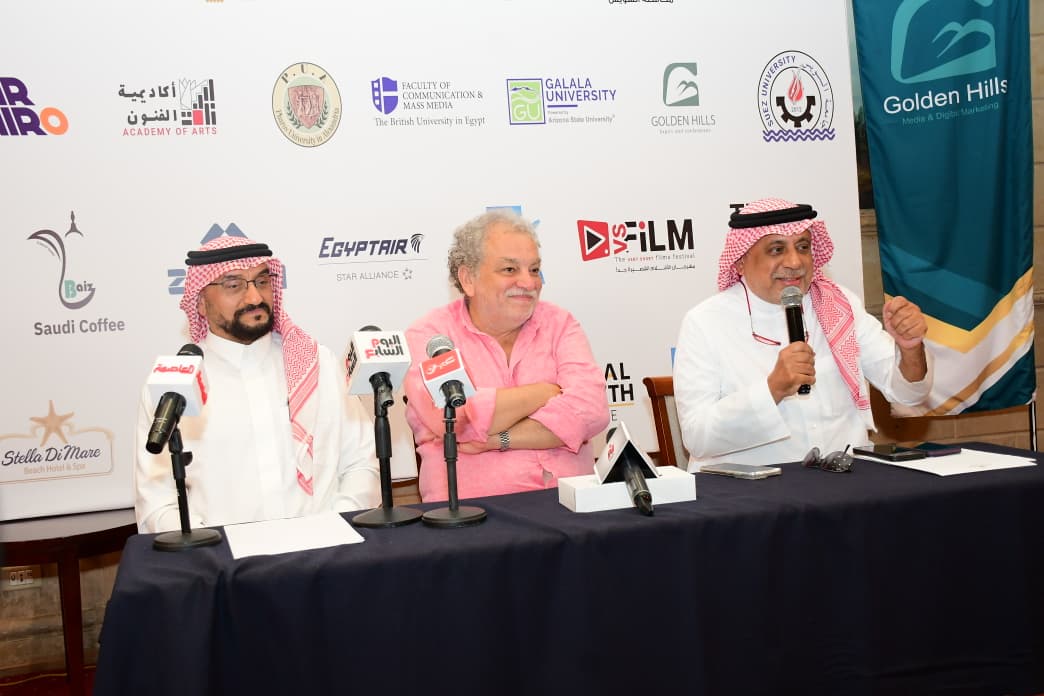The VS-Film Festival for Very Short Films held a seminar today to honor Saudi producer Abbas Bin Al-Abbas, as part of the activities of its second edition currently taking place in Ain Sokhna, Suez Governorate. The seminar was moderated by director Ashraf Faek, with the participation of Saudi media figure Dr. Abdullah Mankhar.
Faek opened the seminar by highlighting Bin Al-Abbas’ journey in cinema, noting that he chose Cairo more than 35 years ago as the starting point for his dream to produce the first full-length Arab animated feature film, “The Knight and the Princess.” The film took nearly 20 years to complete. Faek described the honor as “well deserved for a man who loved cinema and devoted himself to it.”
In his speech, Abbas Bin Al-Abbas expressed his happiness with the tribute and with being among cinema enthusiasts. He spoke of his deep connection to Egypt, where he was born and completed his schooling before later returning to establish his own production company. He emphasized the historical and lasting cultural bond between Egypt and Saudi Arabia.
Bin Al-Abbas discussed his experience with “The Knight and the Princess,” explaining that it was the first fully Arab-produced animated film, inspired by his desire to present content that reflects Arab identity and culture. He recalled that the idea was born when he noticed his son watching Western animated films that conveyed values distant from Arab culture. He said:
“I asked myself, how can our children see the beauty in themselves when all the heroes they watch look foreign? That’s when I decided to produce a major film drawn from our own heritage.”
He noted that the story was inspired by the historical conquest of Sind by Muhammad ibn al-Qasim, not with the intention of documenting a political event, but rather to create a cultural work blending history, imagination, and visual enjoyment. The film’s script was written by the late Bashir El Deek and initially directed by the late Mohamed Haseeb. The cast included iconic Egyptian actors, among them Amina Rizk, Said Saleh, Mohamed Henedy, Abla Kamel, Abdel Rahman Abu Zahra, Majed El-Kedwany, Ghassan Matar, and Ihsan El-Qallaaoui. The songs were performed by Medhat Saleh and Donia Samir Ghanem.
He explained that the characters were designed by artist Mostafa Hussein based on the recorded voice performances, and that the film was produced using traditional frame-by-frame animation to preserve the spirit of classic animation.
Regarding the film’s long production period, Bin Al-Abbas stated that the passing of director Mohamed Haseeb resulted in years of delay, until Bashir El Deek agreed to complete the work with the support of director Atiya Adel Khairy. He emphasized that the final result exceeded all expectations.
Speaking about modern technology, he stressed the importance of keeping pace with contemporary production tools. He added that he continues to produce short films, including a recent seven-minute film about the impact of war on children, which has won 12 international awards.
For his part, Dr. Abdullah Mankhar highlighted the richness of Arab culture with stories worthy of cinematic adaptation, pointing to the depth of Egyptian civilization. He stated that the success of “The Knight and the Princess” was not just a production achievement, but a twenty-year journey of perseverance and dedication.
Dr. Ghada Jabara, President of the Academy of Arts, described the film as “an artistic treasure” featuring many prominent artists, and proposed a special screening of the film for students of the Higher Institute of Cinema — a suggestion welcomed immediately by the producer.
The seminar concluded with the screening of the film’s promotional trailer, featuring the song “Mafeesh Mostaheel” performed by Liqaa El-Khamisi and composed by Haitham El-Khamisi, along with behind-the-scenes footage and voice recording sessions.
